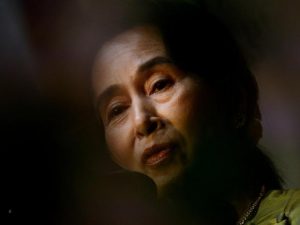Aung San Suu Kyi’s darkening image: From icon to ‘fake news’ ideologue
 Till Wednesday (September 6), Myanman’s de-facto leader Aung San Suu Kyi had said nothing about her country’s latest Rohingya crisis.
Till Wednesday (September 6), Myanman’s de-facto leader Aung San Suu Kyi had said nothing about her country’s latest Rohingya crisis.
If only she hadn’t broken her silence.
In denouncing “fake news” about the Rohingyas’ persecution, she has become anti-heroine extraordinaire. She has gone from a globally admired beacon of resistance to injustice to an advocate of “fake news”, which is to say inconvenient facts.
She is now in the dubious company of US president Donald Trump, who denounces every fact he doesn’t like as “fake news”. She is on a par with Poland’s controversial president Andrzej Duda, a man who leads a country that is moving increasingly rightward and towards illiberal democracy. (Just six weeks ago, Mr Duda signed into law a bill that will limit judicial independence. He vetoed two others, but this one is bad enough.)
Just a couple of days ago, Ms Suu Kyi’s spokesman Zaw Htay, mimicked President Trump’s now-former advisor Sebastian Gorka when responding to Bangladeshi government charges that Myanmar had laid fresh landmines along the border, despite the flood of Rohingya refugees trying to cross to safety.
Just as Mr Gorka questioned the attack on a mosque in Minnesota by suggesting it was a “false flag” operation, Mr Htay appeared to blame the Rohingyas for their misfortune. “Who can surely say those mines were not laid by the terrorists?” he said. (The Rohingya, by the way, are a stateless mostly Muslim ethnic minority. I would say they are one-million strong, but actually they’re not. They’re poor and persecuted, stripped of citizens’ rights in Myanmar, more than 125,000 have been fleeing the Burmese military and those landmines disputed by Ms Suu Kyi’s spokesman killed two Rohingya children and injured a woman.)
But never mind her spokesman. Whatever happened to Aung San Suu Kyi, Asia’s Nelson Mandela, the icon of peaceful resistance, the woman who stood up to Myanmar’s military junta? Whatever happened to the woman who won the Nobel Peace Prize, the person who sacrificed family life to serve as her suffering people’s imprisoned symbol of freedom, unassailable grace and courage?
Well, Ms Suu Kyi has said it herself, often enough before. She is not an icon but a politician. Like President Trump, she is appealing to her base – Buddhist nationalists – by describing the crackdown on the Rohingya as an operation against “terrorists”. She is being pragmatic about the fact that the armed forces have enormous power in Myanmar and it is unrestrained by elected politicians like Ms Suu Kyi.
But surely Ms Suu Kyi could have remained strategically silent, thereby indicating that she was being prevented from allowing truth the full disclosure it deserves? Or she could have spoken out in the courageous way she did during the long years of her imprisonment?

